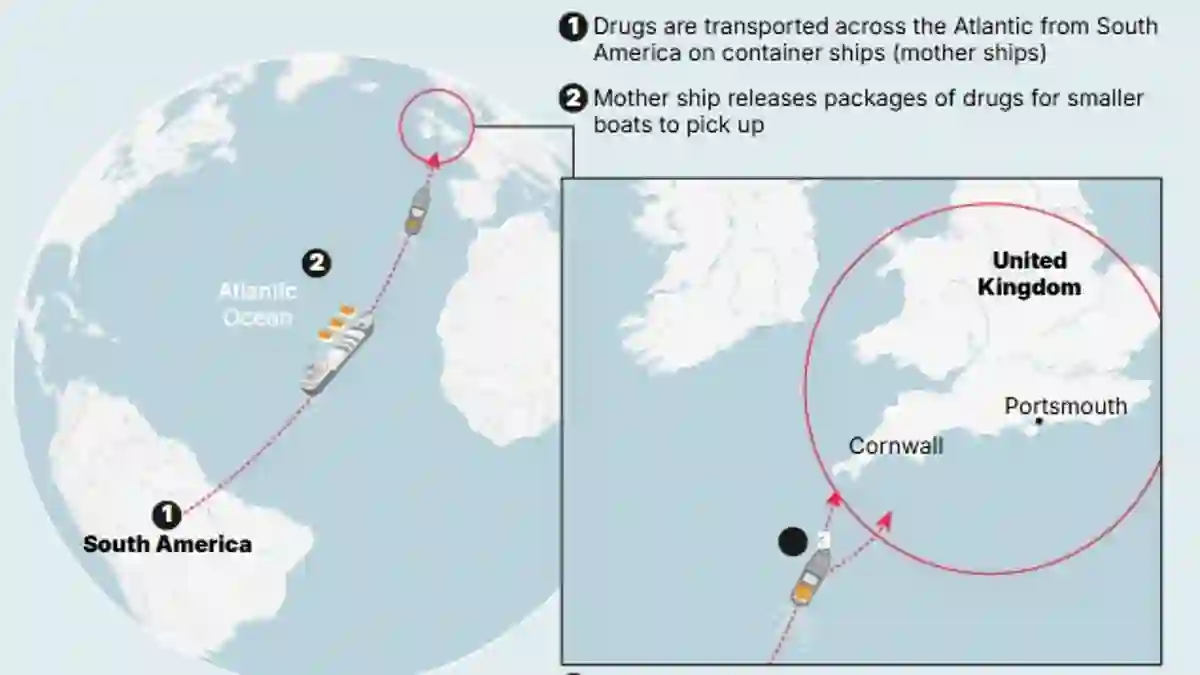It might sound like a Hollywood movie plot — but right now, criminal cartels from South America are using British waters as a dumping ground for drugs, while UK police and special forces scramble to stop them.
Huge cargo ships, known as “mother ships,” are being loaded with cocaine, circling offshore before tossing the haul into the sea for local smugglers to scoop up.
And it’s happening more than you might think.
Cartel Tactics: Hiding in Plain Sight, Then Dropping the Goods
Here’s how it works: traffickers load up massive commercial ships — the kind used to haul cargo across continents — with bales of cocaine.
These vessels sail innocently into European waters, including the UK coast, usually under the radar.
Then, once they reach the right spot, crew members or stowaways on board throw the cocaine overboard.
Each bale is wrapped up tight, attached to a flotation device, and fitted with a tracker — often something as simple as an Apple AirTag.
On cue, small boats from UK-based gangs zip out to grab the bundles and bring them ashore.
Authorities have a name for this tactic: “at-sea drop-off” or ASDO.
The National Crime Agency Sounds the Alarm
According to the National Crime Agency (NCA), this isn’t a small-time issue — we’re talking tens of millions of pounds worth of cocaine being trafficked through this method.
And while some of it gets seized, plenty still slips through.
That’s why the NCA and Border Force are now urging people living along the UK’s sprawling 11,000-mile coastline to keep an eye out for suspicious activity, especially small boats acting oddly near harbours, coves, and remote beaches.
A Dramatic Sting in the Irish Sea
One major operation last month showcased just how intense this battle has become.
In a coordinated mission backed by the U.S. Drug Enforcement Administration (DEA), Ireland’s elite Army Ranger Wing fast-roped from a helicopter onto a Panamanian cargo ship named the MV Matthew in the Irish Sea.
The cargo? Over two tonnes of cocaine, worth a jaw-dropping £132 million — the biggest drugs seizure in Irish history.
Eight men were arrested, and their sentencing on July 4 allowed the full story to finally be made public.
Cocaine Hauls Are Washing Up on British Beaches
Back on UK shores, another four men were recently jailed for a total of 82 years after trying to retrieve a cocaine stash worth £18 million off the coast of Cornwall.
They led Border Force officers on a 28-mile sea chase, eventually fleeing onto Gwynver beach near Sennen.
Only 11 bales were recovered — the rest likely lost or dumped during the pursuit.
In other cases, packages have washed ashore, sometimes months later.
In St Agnes, Cornwall, a black holdall with 40kg of cocaine was found on the beach.
Another 30kg haul turned up in Goring, West Sussex in 2023.
And in Dorset and the Isle of Wight, residents have stumbled upon floating cocaine bricks near popular beauty spots.
The People Behind the Smuggling Aren’t Always Who You’d Expect
What’s striking is that these operations often involve everyday people— like a struggling Hampshire fisherman, recruited into one cartel operation.
Alongside him were three men from Essex, and a 32-year-old Colombian national, Tabora Baca, believed to be a key link between the UK and South American gangs.
Despite claiming he was just a tourist out for a fishing trip, investigators believe Baca had flown into the UK several times and acted as a cartel enforcer.
Meanwhile, phone records, CCTV, and messages helped the NCA arrest the remaining conspirators, who were reportedly planning to distribute the drugs in southeast England.
Drug Tech: GPS, AirTags, and Ocean Pickups
This isn’t just brute force trafficking — it’s high-tech, too. In the recent Cornwall case, the bales of cocaine were dropped from a cargo vessel in the English Channel, fitted with GPS trackers and Apple AirTags, and meant to be located by a smaller boat.
The crew only managed to recover part of the stash before being spotted by Border Force.
Law Enforcement Is Fighting Back — And Calling in Special Forces
To combat this evolving threat, the NCA has launched 60 ASDO-related investigations in the last year alone.
That’s resulted in five tonnes of seized cocaine, 34 arrests, and over 226 years of combined prison sentences.
Border Force now deploys not just patrol vessels and jet skis, but even sniffer dogs at sea.
One such dog, a springer spaniel named Flash, sniffed out a £50 million cocaine load hidden among bananas aboard a ship intercepted near Dover.
The Royal Navy’s Special Boat Service (SBS) is also on standby for high-risk interceptions — showing just how seriously the UK is taking these threats.
Why Cornwall, the Irish Sea, and the South Coast Are Targets
Smugglers aren’t just picking random spots.
They’re targeting locations like Cornwall, the Irish Sea, and the North Sea because of their remote coves, inlets, and beaches — all perfect for landing cargo without drawing attention.
It’s a calculated tactic, and with the UK’s vast coastline, it’s incredibly hard to monitor every inch.
Border Force Sends a Warning to Cartels and Smugglers
Duncan Capps, a senior director at Border Force, warned:
“Border Force officers remain one step ahead of the criminal gangs threatening our border security… We’re making record-breaking seizures and will continue using intelligence and international cooperation to dismantle these operations.”
His message to traffickers?
They will be caught. They will be prosecuted.
